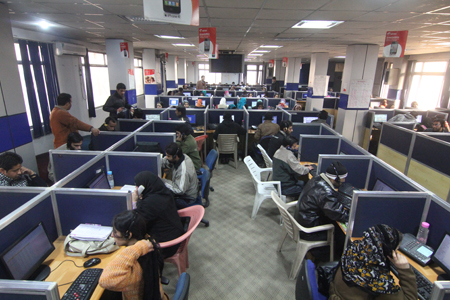They’ve set a standard for quality, and continued work uninterrupted during the height of last year’s unrest in Kashmir. Shams Irfan explores one of Kashmir’s finest call centers.
 Located in the heart of the city, Excess Infrastructure and Telecommunications is one of the few call centers in Kashmir that still functions and provides round-the-clock customer care services to Airtel subscribers, despite the notion that such big ventures end up losing revenues in a conflict prone state like Jammu and Kashmir.
Located in the heart of the city, Excess Infrastructure and Telecommunications is one of the few call centers in Kashmir that still functions and provides round-the-clock customer care services to Airtel subscribers, despite the notion that such big ventures end up losing revenues in a conflict prone state like Jammu and Kashmir.
In 2004, Excess started operations in Srinagar with a staff of just 30 customer services executives. Today, the company employs more than 500 people; out of which some 300 are directly involved with its call center operations. Additionally, the company also looks after Airtel towers, and is responsible for their maintenance and running statewide.
“Excess handles an average traffic of around 30,000 calls a day from Kashmir alone,” said Syed Mohib Mehdi, Center Head for Excess Srinagar.
People who are familiar with this sector revealed that Excess was started with a vision to generate employment in Kashmir. “The idea was to provide the youth in Kashmir with an opportunity to foray into this sector while making them self dependent,” he added.
In 2004, Excess opened its office in Jammu which has a capacity of 300 seats for its call center operations. “We wanted to spread across the valley so that we can retain faith in our customers and provide them with the best of services uninterrupted,” he said.
Just like any other call center in India, employees at Excess work in shifts. “We have divided our working hours in to three shifts. The first shift starts at 7 am in the morning and lasts till 3 in the afternoon, the second shift starts from 3 pm and lasts till 11 pm in the night and the third and last shift starts from 11 pm and lasts till 7 am in the morning,” said Nasir Mehdi, Manager Operations.
“Keeping in mind the situation in Kashmir our morning shifts are essentially for girls. During night shifts we have only male staff,” he added.
In addition to a starting remuneration of around Rs. 6000, Excess provides its staff with free meals [lunch and dinner] and free pick-up and drop services, irrespective of their shift timings.
Excess follows standard selection criteria while hiring employees for their customer services operations in Kashmir. “The basic qualification for an aspiring customer services executive is graduation. Good communication skills and a neutral accent in Kashmiri, Urdu and English is also essential,” said Mohib.
“The rate of attrition being just ten percent, young recruits usually do not switch over from one call center to another as often as is seen in international call centers elsewhere,” he said.
Most of the individuals working at Excess have never been inside a call center before. But that does not deter young aspirants from foraying into this sector. “We have been very liberal with our employment policies. The environment on the work floor is employee friendly and we work like a close knit family,” he said.
Excess has managed to maintain high quality standards and is one of the best service providers in India. “Our scores talk of our dedication and quality. We have succeeded in maintaining 85 percent success rate in prepaid customer care services and 90 percent in post paid services,” added Mohib.
In 2010, during the summer unrest, Excess managed to work round-the-clock without any hindrance. “The challenge was to provide uninterrupted customer service to our clients during those tough times and to show the world that despite unfavorable conditions, we will never let our customers down,” said Mohib.
In December 2008, because of political instability, one of Kashmir’s major cellular service providers—Aircel—winded up its operations in Srinagar and shifted its base to Jammu.
Given Kashmir’s prevailing circumstances, working 24 hours is often challenging. But Excess officials say shifting their base to Jammu or elsewhere like other service providers is out of the question. “The backbone of our customer services business is our Srinagar office, from where we generate our maximum business. We will not relocate,” he said.
“During those difficult times we re-strategized our entire work policy. We divided our entire work force into two groups and each one of them worked full time on alternative days. Sometimes, when things got really bad we arranged for our entire staff to stay at office and provided them with food and lodging,” said Mohib. “But we fulfilled our commitment and that is a relief,” he added.















